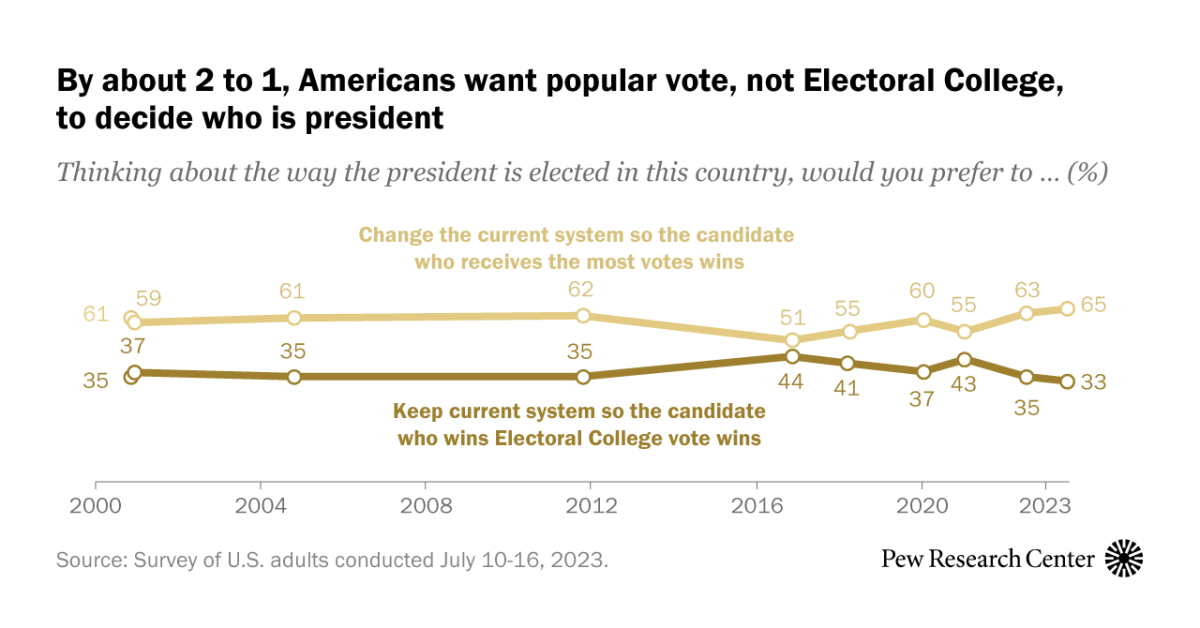65% of U.S. adults say the way the president is elected should be changed so that the winner of the popular vote nationwide wins the presidency.
It’d be nice to go beyond and have some sort of ranked voting while we’re at it. Essentially being forced to pick between two parties or risk having your vote being wasted sucks.
Unpopular opinion: ranked choice voting will do little to solve the USA’s democracy issues.
For starters, there are plenty of countries that do use FPTP and still have plenty of third parties in their parliaments (Canada, UK, Taiwan, Australia off the top of my head). So FPTP does not inherently preclude third parties - rather, the USA simply doesn’t have any culture of multilateralism. I’d say this is mostly a byproduct of various cultural phenomena - the wealth gap, corporate media ownership, private campaign financing, win-or-lose mindset, etc.
But the greater issue is that RCV doesn’t really ensure proportionality. As long as you have a single winner from each district, there will be distortions between the proportion of parties for whom people vote and the ultimate parliamentary body. For example, even if you implemented RCV across the entire USA today, I’m pretty sure most legislative bodies would still be entirely dominated by a single party because of gerrymandering and single-member districts.
So if you want to fix the USA’s core issue, what you really need is a more proportional system - either have fewer, larger districts with multiple representatives from each one, or adopt something like MMP which is what Germany has (where you also cast a party vote to declare your preference for which party you most want represented in parliament and distribute proportionally along this tally across all voters). Not only does this make the final representation more fair, but it also does a much better job of making all votes matter, instead of only the lucky few in swing states or the rare competitive Congressional race.
But RCV on its own won’t do much. It is still a small improvement, and if you have the opportunity to adopt it, I say go for it. But at best, I think it would take decades, or maybe even generations, before it starts to improve things.
Also, while I know this doesn’t pertain quite so much to Presidential elections as the electoral college is used for, the USA is also fairly unique in that it has a directly elected head of government with much more power than other countries that also have a directly elected head of state. This is also a part of the problem - the executive branch is supposed to be the weakest of the 3 Federal branches - but it’s a discussion for another time.
Canada and UK third parties are still smaller parties, they have no possiblity of electing a head of state.
Same as I wrote on the other sibling comment. I think these countries all have terrible electoral systems. But the point is, they’re still ahead of the USA in terms of the fact that they will still have an awareness and understanding of third parties, whereas >90% of Americans are just programmed to believe there are only 2 options.
As a thought experiment, ask yourself what would happen if you could wave a magic wand and make every city, state and national legislative election use RCV over FPTP. Do you really think anything would change? I’m pretty sure 95% of the results would be exactly the same. Like I said above, RCV may make things better 20+ years from now, but there’s also a very good chance that so few people actually use their second options that it nothing ends up changing at all. This is why I think multi-member districts or MMP are better solutions.
But the point is, they’re still ahead of the USA in terms of the fact that they will still have an awareness and understanding of third parties, whereas >90% of Americans are just programmed to believe there are only 2 options.
Are you forgetting Ross Perot almost won? There is constant talk of Trump starting a third party, libertarian and green parties get a fair amount of attention, and not to mention the fact that the two major parties actually consist of many smaller factions in a coalition. There’s a reason primaries happen, and often congressmen vote against the majority of their party and votes are split on other lines than party lines. Most people are smarter than is popular to say on the internet, they just understand voting the lesser of two evil is their best option right now from a certain perspective. I prefer to vote third party to increase the viability of third parties in later elections.
Look at third parties and their success in the UK and Canada.
The last general election in the UK was 2019. Conservatives got 43.6% of the vote but 56.2% of the seats. Labor got 32.1% of the votes and 31.1% of the seats.
The biggest national third party, the Liberal Democrats, got 11.6% of the vote but a mere 1.7% of the seats.
In comparison, look at regional third parties. The Scottish National Party got 3.9% of the vote and a whopping 7.4% of the seats. Irish regional parties like Sinn Feinn and the Democratic Unionist Party got a combined 2.3% of the seats with a combined 1.4% of the seats.
Previous elections have been quite similar. In 2015, the far right UKIP won only a single seat after getting a whopping 12.6% of the vote.
Canada is quite similar. The Bloc Quebecois consistently gets more votes than the national New Democratic Party, despite having gotten less than half as many votes.
Understood, all of these countries have terrible electoral systems, that was not my point. My point is that Americans only have a culture of voting for one of two parties, so switching to ranked choice voting will likely change nothing at all, because Americans already practically never even consider alternate options. Hell, I doubt even 10% of them could even name a third party, so why would they consider voting for them all of a sudden just because of the switch to RCV? They’re constantly blasted with the same message that you have one of two options, so chances are that they’ll just pick one and ignore the rest, just like they do now.
It might give independents more of a voice.
Parties work a bit differently in the US vs e.g. Israel.
In Israel, party insiders choose their politicians. If you want different candidates than an existing party is offering, you have to make your own new party with your own new list.
By contrast, in the US, parties run primary elections where voters pick the candidates. The specifics depend on the state, but in most states the election is held for registered members of that party.
Americans aren’t idiots. Most know third party candidates don’t do well in plurality elections. So smart progressives, alt-right etc. politicians don’t run as a third party candidate against mainstream Democrats and Republicans. Instead, they primary an incumbent Democrat or Republican, like Alexandria Ocasio Cortez, or join the primary when the incumbent retired like Marjorie Taylor Greene.
Somewhere like Israel, Alexandria Ocasio Cortez and Joe Manchin would be in two very different parties. In the US, they’re in the same party.
In places where RCV is passed, you absolutely see more candidates running and getting decent percentages of the vote. Because that isn’t a terrible strategy any more. Someone like AOC might have run as a Progressive or something rather than primarying the Democrat.
For anyone living in Utah, a bill to enable Ranked Choice voting will be in November 2023.
So anyone there please register to vote sooner rather than later.
Currently people are being told it’s too confusing and too liberal, so they really could be more young people votes to help the cause.
Ranked choice still doesn’t solve the winner-takes-all situation that is the presidential election. Instead it should be appointed by a group of competent people, who in turn are voted in by something like ranked choice or whatever.
BREAKING: group of people whose only chance of getting elected is relying on the Electoral College not thrilled about the idea of abandoning the Electoral College
It’s a great idea until it affects them lol
Yeah, dawg forbid they change their platform to, you know, appeal to a majority of Americans…
Part of this piece has an excellent insight into the dichotomy of the Republican Party. Of those highly engaged with politics, only 27% want to ditch the electoral college! These people understand the party is unpopular and the tactics used to hold power are a necessary way to get their policies.
The rest of the group feels otherwise, probably NOT because they don’t care if their candidate gets elected, but rather that they don’t understand how crucial it is to their party (along with gerrymandering). And their first gut instinct is that popular vote is justified/rational/logical whatever.
Now for a little thought experiment: What would happen if this became an actual campaign issue? I’d put my money on those 27% being able to convince the rest of the party how important it is, flipping their view. Maybe I’m wrong, but since many R voters tent to put self interests above all else, it logically follows that they’re just not understanding how critical the electoral college is. If their talking heads went on air/TV each day and stopped talking about how immigrants are stealing jobs or poor people are taking their hard earned money, and instead focused on the importance of the electoral college, they’d flip. Not because they think it’s right or justified. Because they think it’s best for themselves and their party. And it’s the current rallying cry.
Now apply this across an entire party, with those highly engaged telling the others how to vote, what to think about policy, and what the outcomes will be. Bring together uneducated people already susceptible to misinformation, and pair them with intelligent and extremely vocal/active groups who can sell snake oil like the best of them. Take that minority vote and put some real numbers behind it… likely not enough to get a majority, but enough to win a sophisticated electoral college or gerrymandered district.
they probably wouldn’t even try and hide it: they’d literally just come out and say the electoral college helps keep the democrats out and they’d vote for it
Good point. It’ll likely take three words to get a lot of those people to flip: own the libs.
Sometimes I forget how little value some people place in consistency of beliefs. Small government! Except ____. Ad nauseam.
They already have these talking points. They used them when Hillary won the popular vote.
Tyranny of the majority, nobody would have to listen to rural Americans ever again.
It’s all bullshit obviously. But it cut through to moderates last time it made the rounds. And these are swayable voters I’m talking about.
Yes, I think the rabble would quickly fall in line against changing the electoral college. We saw them growing more accepting of LGBT people for a few years only to whiplash back to homicidal hatred once their high priesthood started ranting against the gays again. These poll results are kind of like an interesting Freudian slip though: like you said, when they’re not paying attention a majority of Repubs can organically move to the reasonable opinion before the elites can apply their brainwashing again.
The rest of the group feels otherwise, probably NOT because they don’t care if their candidate gets elected, but rather that they don’t understand how crucial it is to their party (along with gerrymandering). And their first gut instinct is that popular vote is justified/rational/logical whatever.
The (European) centrist part in me think the “less engaged” Republicans are those who like the central right-wing ideas (small government, less taxes etc.), but don’t like how crazy the current Republican party is, and since they have no real representative they identify themselves as “less engaged”. Those people would probably prefer for the electoral college to be abolished so that the current Republican party never gets elected again and they’re forced to shift to candidates that are actually sane in order to win back votes.
…but yeah, your analysis might be correct too, those “less engaged” people could also be MAGAs that just don’t understand how they wouldn’t win an actually democratic election.
I’m sure you’re right about some people. They’re feeling abandoned and disgusted by what’s supposed to have their support and ideologies in mind, therefore not as active. That makes sense.
I know there are a lot of good/reasonable people who just want the government to play a smaller role in society and I think that’s a necessary part of any well-functioning system. And I agree with the sentiment in specific applications. Hopefully there is a way forward for those types to force a change for the better from the current GOP. Because it’s gone off the rails.
My vote would finally matter. My state already knows who it’s supporting with or without me.
yeah, the ‘vote!’ stuff is hard to stomach living where i do, which went red on TV literally the minute polls closed
And so, neither party is going to bother trying to court your vote: one can take you for granted, and the other will write you off. So I hope you have the same concerns as Pennsylvania, Michigan, and Arizona, because that’s what you’re getting.
And the votes of the flyover states become an after thought.
Y-you’re telling me that gasp LAND DOESNT VOTE?!?!
You are so obtuse i would be amazed if you can find a chair that fits.
They are already advantaged in both the house and the senate. Why do they need advantages in literally all elections to feel they are treated fairly?
How?
Everyone gets 2 senators, and then 1 house rep for every so many people.
Not quite, the number of house reps is not strictly proportional to the population of each state. California has 704,566 people per house seat, while e.g. Wyoming has 568,300 per house seat. This means a Californian house vote is worth roughly 80% of a Wyoming house vote.
Exactly!
Why would you want people to decide their countrys future when empty landmass could do it?
Right, because Kansas’s vote should hold the same weight as New York or California even though there’s less people that live in Kansas?
No, but a Kansan’s vote should have the same weight as a New Yorker’s or Californian’s, or even a Pennsylvanian or Michigander. Not all Kansans vote the same way, and it would be nice to have a system that recognizes this.
And that’s okay.
So its bad if peoples votes in densly populated places don’t matter, but it doesn’t matter if people voting in sparely populated areas don’t matter?
But those people’s votes each matter the same without the electoral college?
The money and politicians will focus on the large urban areas, because that will maximize time and money invested.
People in rural areas will not have the capacity to affect things at all.
They get to vote, don’t they? They just don’t get to have their vote given extra privileges just because they live in a sparsely populated area, that’s all.
What extra privlages?
Everyone gets 1 vote as it is now.
Two things I’d love to see. Eliminating the electoral college and then getting rid of superdelegates. Two fundamentally anti-democratic concepts.
Well superdelegates aren’t exactly something the government can legislate away because they’re just an internal thing of the DNC.
Two things I’d love to see.
Don’t forget “ranked-choice voting”.
My goodness, yes.
Under the 2018 rules, in the Democratic National Convention superdelegates can’t participate in the first vote and can participate only in a contested convention. Seems reasonable to me.
Wikipedia also reminded me about this little bit of Bernie hypocrisy that I’d forgotten about: “Sanders initially said that the candidate with the majority of pledged delegates should be the nominee; in May 2016, after falling behind in the elected delegate count, he shifted, pushed for a contested convention and arguing that, ‘The responsibility that superdelegates have is to decide what is best for this country and what is best for the Democratic Party.’” Talk about unprincipled political opportunist.
Yes Bernie is an unprincipled political opportunist.

I can disagree with something Bernie said, but still be a huge supporter of his for his many other things I fully agree with. I maintain that superdelegates being in place to deal with a contested convention is still a bad thing and undemocratic. The real unhelpful part was when the DNC chair stated that it can also quell unintended grassroots efforts. I thought grassroots efforts were an example of a good thing about democracy, not a bad one.
Bernie Sanders is emphatically not a Democrat and doesn’t want to do any of the work of building or supporting the party, but when he decides to run for president, he suddenly wants the party’s money and infrastructure, only to abandon the party ASAP after the election. He may be fine as a senator, but as a presidential candidate, he’s just so utterly loathsome. He’s got major entitled old white man syndrome and it makes me lose absolutely all respect for him.
If you’re on to a contested convention, you can’t directly reflect the will of the primary voters in the first place (because they didn’t pick a winner) so I can’t really find any reason to object to superdelegates, most of whom are elected Democrats and already literally representing their constituents in Congress, etc.
Ranked choice voting please.
Came here to say this.
The electoral college was created at a time when faster-than-horse communication didn’t exist. It made sense then, but has not grown with the times.
I fail to see how it ever made sense.
The year is 1780. The printing press is the pinnacle of technology, there’s no such thing as an adding machine. Most correspondence is done on parchment with a quill pen. The majority of Americans cannot read or write. Information cannot travel beyond earshot faster than a galloping horse. Elect a president by popular vote. You have four months.
That’s not even it. At the time the Constitution was adopted, there were states like Virginia that had a lot of people, but rather few voters. They were afraid that they wouldn’t have a real say in who the president was. The Electoral College was a way to inflate slave states’ power, and entice them to join the Union.
When you say majority, do you mean by popular vote, or…
The whole thing is absurd and overly represents rural areas and Republicans. We already have a huge problem with the “2 senators per state” thing and the House representing Republicans far too much in relation to their numbers.
I’m 100% okay with the 2 senators per state thing. That’s a feature, not a bug. Even though cities are on the right side of history right now, I don’t want to completely silence the rural vote forever.
However, arbitrarily limiting the number of House reps is absolutely absurd and counter to the purpose of the House. That is a bug.
Well, then, maybe we should start considering splitting up some states and joining others together then. A place like California is more future-minded and it’s where a great deal of the people are, as well as much of our economy. Also, it’s where a lot of our food is grown. And it gets 2 Senators.
The 2 Dakotas have more than that, and what do they really represent for the future of America and the world? More fracking?
Maybe states with really large masses and hardly anyone in them are combined. Idaho, Montana and Wyoming - one state. North Dakota, South Dakota and Nebraska, another.
Again, you’re intentionally defeating the purpose of the Senate. The entire point is to give rural, less populous areas more of a voice.
It feels like a compromise from a period of time that is no longer relevant to these times when we are trying to push this country into the future. I don’t want rural regions to have more of a voice, FFS. Look at what it is doing to this country. Having fewer people have an equal say with the majority of the people is also not great, the majority should win out. Why the fuck should tracts of land be voting?
We should never completely silence the voice of a group of people for all time, even if right now they’re pushing some heinous shit.
Part of the reason for the phenomenon of Trump was the failure of politicians to care about the legitimate problems that rural voters have.
In any case, if the House and Electoral College functioned like they should, the majority would win a lot more often. Don’t focus on the Senate, focus on the two institutions that weren’t designed to give rural people an outsized choice but have been manipulated to do so.
But but but why should cities get to determine everything? Don’t you know that not only does land vote, everyone in a patch of land votes the same? So, why bother giving everyone in a city a vote, you know?
Also, be sure to let the vice president cancel the whole thing if they don’t like the results.
(Please tell me my sarcasm is obvious.)
We should just abolish the Senate. With the current formulation of the US government there’s no reason why a State should have extra power like that. Let the people make the rules. Expand the House, abolish the Senate, and remove the electoral college. And since we’re wishing for things that will never happen anyway, go ahead and use some kind of proportional vote (ranked choice, star, whatever, just literally anything but FPTP).
I feel like while the electoral college is an issue, it’s the gerrymandering that is ultimately the biggest issue.
And in fact probably also contributes to the electoral college issue.
The senate is pretty bad too.
In theory we could expand the number of house seats so that more populous states get more reps and everyone has a more equal number of voters per congressperson. I think that would not only help make the house more fair but would also make the electoral college more fair (since the # of electors increases with the number of house members). Not as good as the popular vote, but it’s an improvement that doesn’t require a conditional amendment.
Although it’s somewhat inconceivable to some people that the US can have more than 50 states (and that DC isn’t what it once was), don’t forget about representation for DC and Puerto Rico.
Both which operate very much like state entities now, making a pretty good argument for true federal representation with proper voting power.
Representation for DC would be harder to justify, but if a party actually pushed for it Puerto Rico statehood would have a fair chance.
The US has less representation per capita than most developed nations.
To be fair, it’s also the most populous developed nation.
I don’t really understand how we fix gerrymandering. Districts can sue the state for making their elections more competitive, less competitive, or a perceived slight. Every time maps are drawn, 99.9% of districts become less competitive, offering a safer win for both of the two major parties where they expect to win. Strategically voting for third parties that can put Ranked Choice in place is… Possible, but incremental.
So yeah it seems like ending the electoral college is less complicated. It seems very popular with most people and half the politicians.
The “founding fathers” would be against the electoral college today too. The electoral college was an idea to try to get the people to directly vote for the president.
The electoral college was necessary because it would have been logistically impossible for people living in 18th and 19th century America to be able to participate in a single-day one person one vote election, given their level of technology at the time.
We live in the 21st century. We have instantaneous means of communication via the internet making designating an elector to travel to Washington unnecessary, a greatly expanded infrastructure via roads and mass transit for people to travel to polling places in a reasonable amount of time in a day, computers that can tally the ballots many hundreds of times faster than a human being can, and vastly expanded capacity for handling the logistics of running a nationwide election including a complex bureaucracy dedicated to oversight and enforcement of voting laws and regulations.
The electoral college is an archaic system whose only purpose has been completely supplanted by modern technology. Any notion of rogue electors defending the republic from authoritarians and populists is not only historically false, but given the fact that they failed to prevent exactly that situation from happening once already, laughably ineffective.
The electoral college was necessary because it would have been logistically impossible for people living in 18th and 19th century America to be able to participate in a single-day one person one vote election, given their level of technology at the time.
That had nothing to do with it. It would have been extremely easy for people in each state to count the votes for that state, then bring those vote totals to the capital where those state-totals are added together to get the final country-wide count. The problem is that that kind of simple, one-person one-vote system means that each vote would be weighted equally, and in some states there was a large portion of the population that couldn’t vote but the state’s decision-makers still wanted that portion to affect how much say that state had in choosing the President.
So basically, the Electoral College is there because of slavery.
Also, there have been times where electors got the names wrong lol. Imagine losing because somebody put your name wrong. I mean I guess there’s precedent for the supreme Court picking a winner already. God I hate this country.
The electoral college exists because the founding fathers didn’t want normal people voting for president. The whole point is to isolate people from directly choosing a president.
And it worked better before information was so easy to obtain.
I propose the National Popular Vote Interstate compact. Cgp grey has an amazing video on it. It’s a “petition” of sorts that basically says that states that sign it will have its elective representatives vote with the majority vote of their said state.
Here’s the video if anyone wants to watch it: https://youtu.be/tUX-frlNBJY
I would modify the electoral college rather than get rid of it. Make it so that states are obligated to assign their electoral votes to candidates in proportion to the number of votes received. For example, Maryland might go 60% blue and 40% red, so they would give 6 of their 10 votes to blue and 4 to red.
This would de-emphasize the importance of swing states, not completely disenfranchise rural voters, and would return a result that more closely mirrored the popular vote. It might also pave the way for a 3rd party to be relevant if the stars aligned elsewhere.
there is absolutely no valid argument to do anything that isn’t simply tallying all the votes. because of course that’s how it should work
First we need a federal initiative/ referendum system. Because the existing politicians will never vote to limit their own power.













